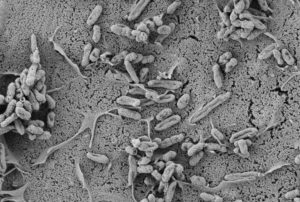
Dr Tim Hinks has been awarded a Wellcome Trust Clinical Research Career Development Fellowship. The funding that comes with the award will allow Dr Hinks, who is also supported by the NIHR Oxford Biomedical Research Centre, to establish his own research group and purchase the necessary equipment and research reagents.
Dr Hinks is a Senior Clinical Researcher in the Experimental Medicine Division of the University’s Nuffield Department of Medicine, and in the NIHR Oxford BRC’s Respiratory Theme.
“I’m delighted to receive this prestigious award,” Dr Hinks said. “It will allow us to significantly develop the Oxford Respiratory Unit’s research into the immunology of lung diseases including asthma and chronic obstructive airways disease [COPD].”
In the UK, 5.4 million people, or 1 on 12 of the population, receive treatment for asthma. The condition severely impacts on the lives of individuals, and on the economy, with 4.1 million working days lost each year, despite £1 billion of NHS spending.
Exacerbations
Asthma remains a terrifying condition, claiming three lives each day in the UK. These deaths, and most symptoms, are caused by ‘exacerbations’, often called ‘asthma attacks’. These are usually caused by viral or bacterial infections which activate immune cells of the airways to cause inflammation.
However, the mechanisms underlying this inflammation are poorly understood and are considered the top priority for European asthma researchers to address.
Dr Hinks explained the nature of his research: “I have discovered that a recently-described class of immune cells, called ‘MAIT cells’ [Mucosal-associated invariant T cells], is important in fighting infections in the airways. I found that these cells are deficient in asthma and COPD as a result of the steroids that are the mainstay of treatment.
“This may explain the increased risk of infections in these people, including subtle long-term airways infections which could be driving the inflammation which causes the exacerbations.”
In 2017 a trial showed that long-term use of the antibiotic Azithromycin reduced exacerbations in severe asthma.
 Dr Hinks (left) said: “While this was an exciting step forward, it nonetheless raised important questions: How does this drug work? Which asthma sufferers are most likely to benefit? How long should treatment last? Can alternative, non-antibiotic treatments be equally effective but without risks of antibiotic resistance? Is it possible to reduce infection using MAIT-cells?”
Dr Hinks (left) said: “While this was an exciting step forward, it nonetheless raised important questions: How does this drug work? Which asthma sufferers are most likely to benefit? How long should treatment last? Can alternative, non-antibiotic treatments be equally effective but without risks of antibiotic resistance? Is it possible to reduce infection using MAIT-cells?”
Protection
Dr Hinks’s recent research has suggested that protection from ‘MAIT cells’ against infection can be boosted very simply by inhaling molecules derived from vitamin B2, an approach that could potentially be used in treatment of asthma, COPD and in vaccination against a wide range of infectious diseases.
“My goal is to address these problems by asking several questions. Firstly, how do bacteria become established as infections in the airways of people with asthma? Secondly, what effects do they have on inflammation in the lungs? Thirdly, how does Azithromycin reduce inflammation in airways disease? And fourthly, can we reduce infection by boosting MAIT cells using vitamin-related molecules?”
“If I achieve my goal we will better understand the immune responses which protect us from lung infections. This is essential to defining which patients with asthma should receive Azithromycin and whether there are better alternative therapies. If alternatives can be used we can save this valuable medicine for other uses, reducing antibiotic resistance. If boosting MAIT cells is effective, this could lead to development of improved vaccines for a wide range of lung infections, which cause 6% of global human disease.”
The Wellcome Trust Clinical Research Career Development Fellowship allows graduates to continue their research at postdoctoral level and develop scientific independence. It provides support for five years and the flexibility to balance research and clinical responsibilities.